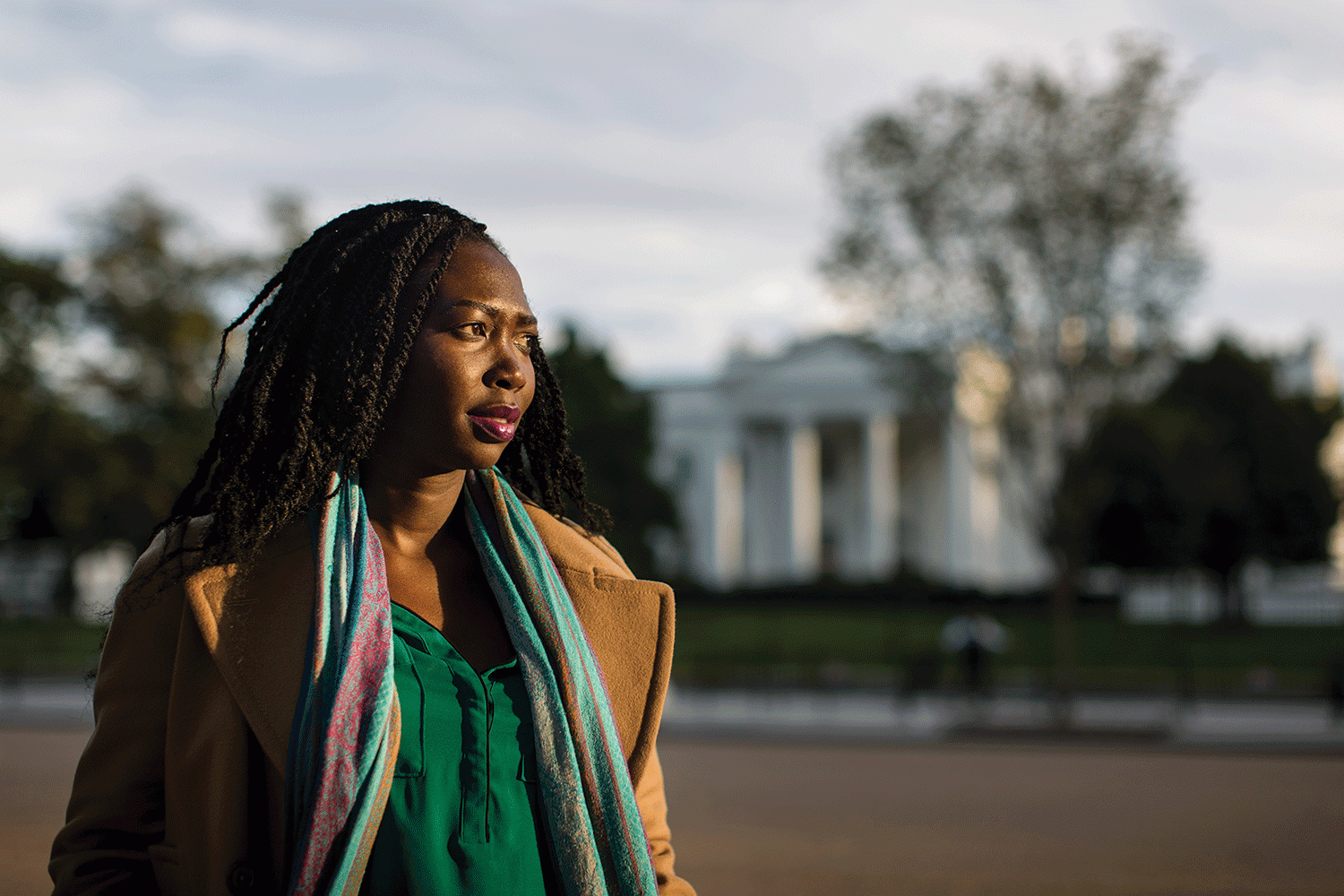
The Journey

When Stella Lunyaramoi fled war-torn South Sudan, she began an improbable journey that led her to CU Boulder — and the White House.
Stella Lunyaramoi’s eyes well up.
“I was 5, maybe 6,” she said, recalling an afternoon more than two decades earlier. “I was playing with my friends outside, building sand castles, then we heard gunshots. I remember it was December because we had just celebrated Christmas. We started running and everyone went their own way. My siblings and my parents all got separated.”
Lunyaramoi (IntlAf ’14) never saw her mother or father again. It was the mid-1990s and the Second Sudanese Civil War had come to her hometown of Chukudum, in the country’s southeast. Salvatore Lonyaramoi and Catherine Dario were two of its roughly 2 million victims.
For weeks, Stella, the middle of five children, walked among strangers in a caravan of weary refugees toward a camp in Kenya. Her sandals disintegrated, so she finished the journey barefoot.
Despite the scarcity of food and water, and the loneliness and fright, she persevered, subsisting largely on hope. Hope, help and determination eventually reunited her with her siblings in Kenya, took her to the United States and eventually brought her to CU Boulder.
In 2014 the journey carried this “Lost Girl” from South Sudan to an internship at perhaps the most famous residence on earth.
“I had no idea about the White House, or the U.S. or anything in America,” said Lunyaramoi, now 26. “To step in the grounds of the White House, the most powerful place in the world . . .”
Sitting in an East African restaurant near Dupont Circle in Washington, D.C., on a rainy evening in September, her voice trails off. Memories of the eight years she spent at the Kakuma refugee camp in Kenya, where violence and hunger were constant companions, seem as fresh as the spongy injera bread she uses to pinch pieces of chicken and potatoes.
Lunyaramoi’s parents were teachers and passed on to her a love of learning. Always a good student, she was chosen from among tens of thousands of children at Kakuma by an agent of Sister Luise Radlmeier, a German nun, to attend a Catholic boarding school in Nairobi. Lunyaramoi was 13. From there she immigrated to the United States and in 2006 landed in Boulder, without a winter coat.
With the help of a host family — Lunyaramoi today calls Michele (Anth’81) and Mike Ritter (Chem’81) “mom and dad” — she acclimated and came to love Boulder, whose mountains remind her of her homeland.
She attended high school in town, then came to CU, where she studied international affairs, became events director for the African Students’ Association and made “lifetime friends,” she said.
A handful of South Sudanese refugees had come to CU before her, starting in 2004 with Micklina Peter Kenyi (PolSci’08; MEdu’14), who now runs a Boulder-based organization, the Empowerment Through Education Foundation, which helps educate children in South Sudan, primarily girls and women.
To be sure, Lunyaramoi knew lonely moments.
“It would get overwhelming sometimes to be the only black kid in a 350 [-seat] economics lecture hall,” she said.
But CU was ultimately a transformative experience, she said: “The school has given me an opportunity to find myself.”
I want to shoot for the stars, always."
After graduating, she was considering staying to pursue a master’s degree when the Ritters encouraged her to apply for the White House internship — and she got it.
Lunyaramoi isn’t supposed to discuss much of what she did in Michelle Obama’s office, she said, but she called the experience “exceptional.”
“It made me realize that anyone can do anything,” she said.
One of about a dozen “Lost Children” to study at CU Boulder to date, Lunyaramoi today works for the American Association for the Advancement of Science in Washington. Now a U.S. citizen, she said she’ll always feel her birth country within her and hopes to help rebuild it.
Lunyaramoi tells her story in The Dawn Will Break, a forthcoming documentary about the harrowing tale of Sudan’s “Lost Girls,” the moniker that has come to characterize those orphaned by the war. Co-produced by Micklina Peter Kenyi, the film will show initially at film festivals and human rights events.
Separated by age but bound by powerful shared experiences, the two women talk often.
“She is the reason all of us came to Boulder,” Lunyaramoi said. “I owe it to her and am thankful for her every day.”
As for the term “Lost Girls,” Lunyaramoi understands it, but prefers an alternative.
“I would use ‘displaced’ rather than ‘lost,’ because I have left my country and my family, but I did not lose hope, so I am not lost,” she said. “I stil l have myself. I still feel like I am destined for bigger and better things. Maybe there’s nothing better than the White House, but I want to shoot for the stars, always.”
Photos by Justin Tsucalas

